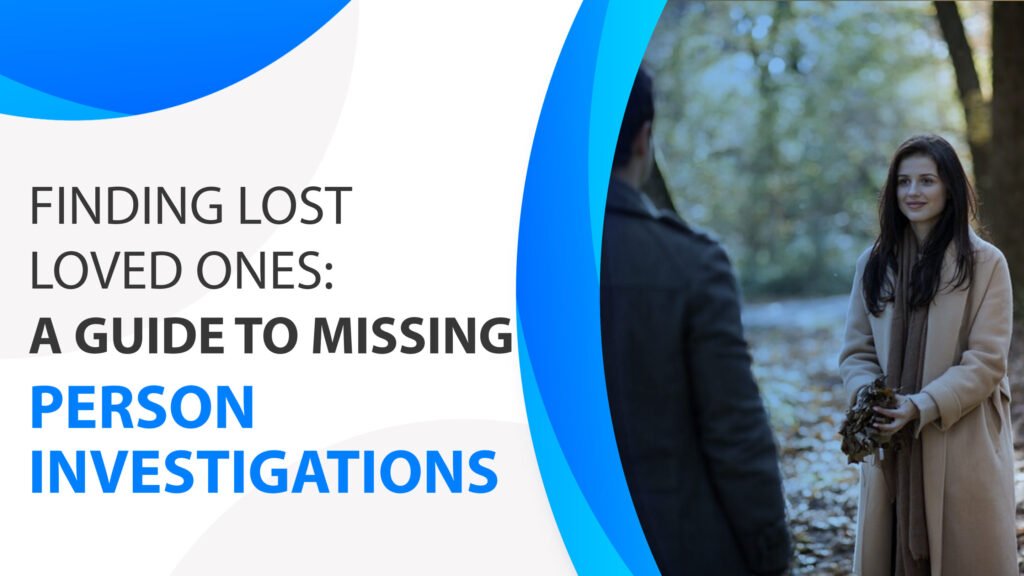The absence of a loved one can be a terrifying and disorienting experience. Whether it’s a child who hasn’t come home from school or an elderly relative who has wandered away, the first step is to take action. This guide will equip you with the knowledge and resources to navigate a missing person investigations, offering valuable insights into collaborating with law enforcement, utilizing online tools, and coping with the emotional rollercoaster of searching for a loved one.
The Initial Steps: Reporting Missing and Gathering Information
The first 48 hours following a disappearance are considered critical in missing person investigations case. Here’s what you should do immediately:
- Contact Law Enforcement: File a missing person report with the local police department without delay. Provide them with all available information, including the missing person’s full name, age, description, last known location, clothing worn at the time of disappearance, and any medical conditions or identifying features.
- Gather Details: While reporting to the police, be prepared to answer questions about the person’s routine, habits, recent activities, and emotional state. Collect recent photos, including full-body shots and close-ups that clearly show their face.
- Document Everything: Keep a detailed record of your interactions with law enforcement, including names, dates, and times of contact. Note down any leads or information they share.
Working with Law Enforcement
Law enforcement plays a vital role in missing person investigations. Here are some strategies to make collaboration a breeze:
- Be Persistent: While respecting police procedures, don’t hesitate to follow up on the case. Express your concerns and ask questions if updates are slow forthcoming.
- Provide New Information: If you discover any new details, no matter how trivial they may seem, share them with the police immediately. This could include witness accounts, phone records, or social media activity.
- Respect Boundaries: Recognize that law enforcement might have limitations due to ongoing investigations or privacy concerns. Trust their expertise and avoid hindering their work.
Harnessing the Power of Technology
The digital age offers valuable tools to amplify the search for missing loved ones. Put technology to work for you:
- Social Media: Utilize platforms like Facebook, Twitter, and Instagram to spread the word. Create dedicated pages for the missing person, sharing photos, descriptions, and updates on the search efforts. Encourage others to share the information and keep the case visible online.
- Missing Person Websites: Register the missing person on national and regional missing person databases like the National Missing and Unidentified Persons System (NamUs) in the US or the Missing Persons Information Network (MPIN) in Canada. These databases act as centralized resources for law enforcement and the public.
- Online Search Engines: Conduct a thorough online search using the missing person’s name, nicknames, and any known online aliases. Search for news articles, social media profiles, or any digital footprint that might offer clues.
Spreading Awareness Through Traditional Media
Traditional media outlets can play a crucial role in generating public awareness about a missing person investigations. Here’s how to get media coverage:
- Press Releases: Draft a clear and concise press release detailing the missing person’s information, the circumstances of the disappearance, and contact details for law enforcement. Send it to local news stations, newspapers, and radio stations.
- Public Appearances: Consider holding press conferences or public events to share the missing person’s story and generate public interest in the case. This could involve pleading for witnesses to come forward or requesting assistance with search efforts.
Maintaining Emotional Wellbeing During the Search
The search for a missing loved one can be emotionally draining. Here are some tips to cope with the stress and maintain your well-being:
- Seek Support: Don’t isolate yourself. Surround yourself with supportive family and friends who can offer emotional support and help you navigate this challenging time.
- Self-Care: Prioritize your own physical and mental health. Engage in activities that help you manage stress, such as exercise, meditation, or spending time in nature.
- Grief and Loss: Acknowledge and process your emotions, whether it’s fear, anger, or despair. Consider joining a support group for families of missing persons to connect with others who understand your situation.
Continuing the Search: Beyond the Initial Steps
While the initial 48 hours are crucial, the search for a missing loved one can extend for weeks, months, or even years. Here’s how to stay focused and proactive during a long-term investigation:
- Maintaining Public Awareness: Don’t let the case go cold. Continue sharing information about the missing person on social media and online platforms. Organize anniversary events or hold vigils to keep the search efforts visible in the public eye.
- Private Investigators: Depending on the resources available, consider hiring a private investigator with experience in missing person cases. They can offer specialized investigative skills and uncover leads that law enforcement may have missed.
- Financial Considerations: A prolonged search can incur unexpected expenses. Research financial assistance programs or fundraising options to help manage any costs associated with the investigation.
- Legal Considerations: In some cases, legal guidance might be necessary. An attorney specializing in missing person investigations case can advise you on legal matters such as guardianship or financial management if the missing person’s absence becomes long-term.
Types of Missing Person Cases
Understanding the different types of missing person cases can help guide your search efforts:
- Runaway Cases: These often involve teenagers or young adults who leave home due to family conflict, emotional distress, or seeking independence.
- Abduction Cases: These are situations where the missing person is believed to be taken against their will. These cases require immediate and close collaboration with law enforcement.
- Lost Disoriented Persons: This could involve elderly individuals with dementia or young children who may have wandered away from their surroundings.
- Endangered Missing Persons: This category includes situations where the missing person is believed to be in danger due to a medical condition, suicidal intent, or exposure to the elements.
Coping with Different Outcomes
The search for a missing loved one can lead to various outcomes. It’s important to be prepared for each possibility:
- Finding the Missing Person Alive: This is the most desirable outcome. Be prepared to offer emotional support and help the missing person reintegrate into their life.
- Finding the Missing Person Deceased: While a devastating outcome, closure can bring a sense of peace and allow you to begin the grieving process.
- The Case Remains Unsolved: This can be incredibly difficult, but maintaining hope and continuing to search can offer some solace.
Remember: Every missing person case is unique. The information and resources provided here serve as a general guide. It’s crucial to adapt your approach based on the specific circumstances of your situation or hire the best missing person detective agency in Delhi for the investigation.
Never Give Up Hope
The enduring love and determination of family and friends are powerful forces that can make a difference in missing person cases. By utilizing the available resources, collaborating with law enforcement, and maintaining hope, you can increase the chances of a successful outcome. Even in the face of uncertainty, remember that you are not alone.



